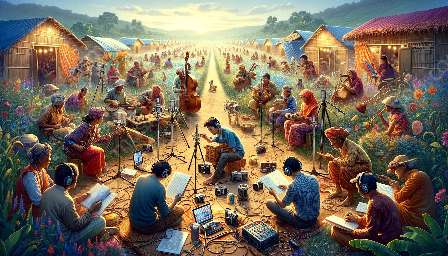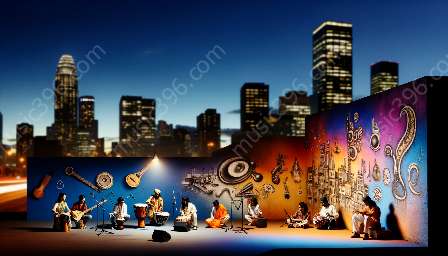Traditional music has played a significant role in the social and political fabric of many societies, influencing and reflecting changes in cultural and political dynamics. In the field of ethnomusicology, scholars and researchers have employed fieldwork to study the intricate relationship between traditional music and social/political change, revealing valuable insights into the ways music can serve as a catalyst for transformation and resistance. This topic cluster delves into the multifaceted connection between traditional music and social/political change, offering an in-depth exploration of this captivating interplay.
The Influence of Traditional Music on Social and Political Change
Traditional music has historically been intertwined with the social, cultural, and political identity of communities around the world. In many contexts, traditional music has served as a means of expressing collective experiences, values, and aspirations, making it an essential vehicle for conveying the narratives of social and political change. Through its poetic and melodic elements, traditional music has the power to articulate the struggles, triumphs, and grievances of marginalized groups, often serving as a platform for voicing dissent and advocating for change.
Ethnomusicology and its Contributions
Ethnomusicology, the scholarly study of music and culture, has played a pivotal role in examining the impact of traditional music on social and political change. By engaging in fieldwork, ethnomusicologists have been able to immerse themselves in the rich tapestry of traditional musical practices, gaining firsthand insights into the ways in which music intersects with social and political dynamics. Through extensive research and analysis, ethnomusicologists have elucidated the transformative potential of traditional music as a force for societal and political shifts, shedding light on its capacity to mobilize communities, contest power structures, and foster unity.
The Role of Fieldwork in Ethnomusicology
Fieldwork in ethnomusicology constitutes an indispensable approach for investigating the relationship between traditional music and social/political change. By conducting immersive fieldwork, researchers can document the multifaceted dimensions of traditional musical traditions, capturing the nuances of performance, transmission, and reception. Through participant observation, interviews, and archival research, ethnomusicologists can gather a wealth of qualitative data that offers a comprehensive understanding of how traditional music both reflects and shapes social and political narratives. Fieldwork also enables the exploration of the localized, contextualized nature of traditional music, unveiling its adaptive and resilient qualities in the face of social and political upheaval.
The Dynamics of Transformation and Resistance
Traditional music has been a catalyst for transformation and resistance in various historical and contemporary contexts. Its ability to convey narratives of struggle and resilience has empowered communities to challenge oppressive regimes, advocate for human rights, and affirm cultural autonomy. Ethnomusicologists have documented instances where traditional music has provided a platform for voicing dissent, preserving cultural heritage, and mobilizing collective action, illustrating its instrumental role in catalyzing social and political change. Through meticulous fieldwork, ethnomusicologists have illuminated the ways in which traditional music serves as a site for negotiating power dynamics, fostering solidarity, and asserting agency in the face of social and political adversity.
Cultural Revitalization and Identity Politics
Within the realm of traditional music, the revitalization of cultural heritage and the negotiation of identity play a crucial role in instigating social and political change. Ethnomusicologists have explored how traditional musical practices serve as a conduit for reclaiming cultural autonomy, challenging dominant narratives, and resisting cultural homogenization. Through fieldwork, researchers have documented instances where traditional music has been leveraged as a means of asserting cultural pride, reclaiming ancestral knowledge, and challenging hegemonic forces, thereby contributing to the broader discourse on cultural resilience and identity politics.
Negotiating Power and Agency
Traditional music has been integral in negotiating power relations and asserting agency within diverse social and political landscapes. Ethnomusicologists have engaged in fieldwork to examine how traditional musical expressions foster agency among marginalized communities, challenging hegemonic structures and advocating for social justice. Through participatory research methods, such as collaborative music-making and community engagement, researchers have uncovered the ways in which traditional music engenders empowerment, fosters resilience, and amplifies the voices of those marginalized by dominant power dynamics.
Case Studies and Comparative Analyses
Exploring specific case studies and conducting comparative analyses has been instrumental in elucidating the intricate dynamics of traditional music and its impact on social and political change. Ethnomusicologists have utilized fieldwork to delve into diverse musical traditions, uncovering localized forms of resistance, resilience, and transformation. By conducting in-depth case studies and comparative analyses, scholars have highlighted the adaptive strategies utilized within traditional music to navigate social and political upheaval, offering nuanced insights into the diverse ways in which music intersects with broader societal shifts.
Continuity and Change in Traditional Music
Through meticulous fieldwork, ethnomusicologists have examined the processes of continuity and change within traditional music, shedding light on how musical traditions evolve in response to social and political transformations. By documenting the transmission of traditional musical practices across generations and societal shifts, researchers have emphasized the dynamic nature of traditional music, showcasing how it adapts, innovates, and resists in the face of changing social and political landscapes. Case studies and comparative analyses have revealed the resilience of traditional music as it navigates complex historical trajectories, contesting the notion of static cultural forms and emphasizing the fluidity of tradition in the context of social and political change.
Transnational Influences and Globalization
The impact of transnational influences and globalization on traditional music has been a focal point for ethnomusicological research, prompting scholars to engage in cross-cultural fieldwork to unveil the complex interplay between global forces and localized musical traditions. Through comparative analyses, researchers have illuminated the ways in which traditional music negotiates and adapts to transnational flows of culture, highlighting its agency in navigating the currents of globalization while simultaneously upholding its rootedness in local social and political contexts.
Conclusion
The intersection of traditional music and social/political change offers a rich terrain for exploration within the field of ethnomusicology. By employing fieldwork to study traditional music in diverse cultural contexts, ethnomusicologists have unveiled the dynamic ways in which music reflects, shapes, and resists social and political change. Through case studies, comparative analyses, and an in-depth examination of the transformative potential of traditional music, scholars have contributed valuable insights to our understanding of how music serves as a catalyst for social and political transformation. This topic cluster provides a comprehensive overview of the captivating interplay between traditional music and social/political change within the realm of ethnomusicology, illustrating the enduring relevance of music as a profoundly influential force in the fabric of human society.



































